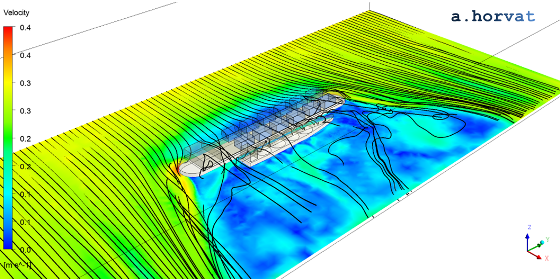Liquefied Natural Gas (LNG) is becoming an increasingly popular way of transporting otherwise gaseous fuel over large distances.
Much of this transport is conducted using LNG ocean carriers. As part of the engineering design and safety assessment process,
it is important to understand related hazards from loss of containment of LNG onto water.
Natural gas in its liquid form is transported and stored below its saturation temperature of -160C. In contact with ambient,
LNG starts to boil generating a low temperature cloud that is heavier than air. Due to low temperatures, any contact with LNG
will cause irreversible tissue damage. Furthermore, strength, ductility and toughness of the ship steel hull will also be affected.
CFD modelling of LNG spills and Rapid Phase Transition (RPT) event

Imposed wind velocity field
The rate of LNG evaporation depends on the temperature difference between the LNG pool and the water. When the initial film boiling
regime collapses, rapid evaporation also known as Rapid Phase Transition (RPT) event may occur. This will produce a propagating
pressure shock front and cause significant structural loads on the ship hull.
As the cloud mixes with the surrounding air, it becomes flammable. Heated by the ambient, it rises and is finally dispersed by the wind.
The objective of the study was to understand the immediate and escalation consequences of an LNG release from a Floating LNG (FLNG) facility onto water while a LNG carrier is present alongside:
As the cloud mixes with the surrounding air, it becomes flammable. Heated by the ambient, it rises and is finally dispersed by the wind.
The objective of the study was to understand the immediate and escalation consequences of an LNG release from a Floating LNG (FLNG) facility onto water while a LNG carrier is present alongside:
- the size of the flammable cloud due to flashing and evaporation of LNG
- the overpressure due to Rapid-Phase-Change (RPT) event
References
- A. Nelson & S. Shaw, E-mail to A. Horvat, July 2014.
Dr Andrei Horvat
M.Sc. Mechanical Eng.
Ph.D. Nuclear Eng.
phone
+44 79 72 17 27 00
skype
a.horvat
e-mail
mail@caspus.co.uk
M.Sc. Mechanical Eng.
Ph.D. Nuclear Eng.
phone
+44 79 72 17 27 00
skype
a.horvat
mail@caspus.co.uk

